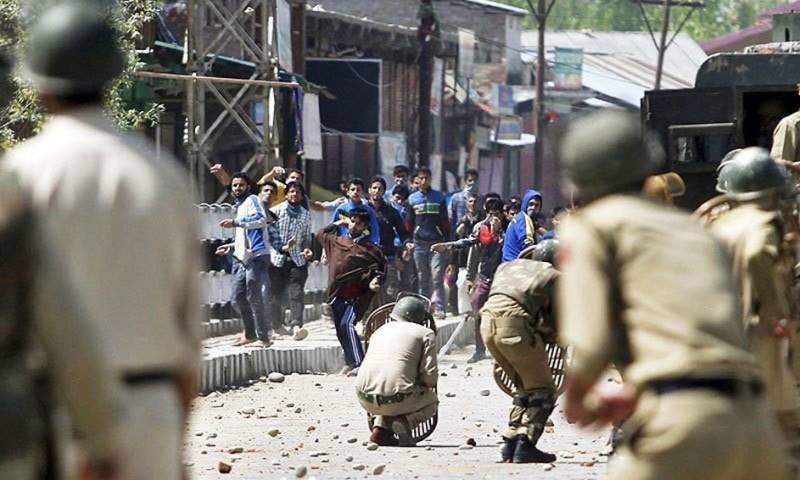ISLAMABAD - Pakistan is awaiting India’s reply on its offer to review the death sentence of spy Kulbushan Jadhav, officials said.
Earlier, Pakistan had invited India to file a review against a military court’s death sentence last year. The invitation came after Jadhav alias Mubarak Patel refused to lodge an appeal against his conviction in Pakistan and will try instead for a pardon.
Pakistan had also granted consular access to Jadhav recently as directed by the International Court of Justice. Months earlier, a meeting with his family was arranged. After the gesture by Pakistan, India said it was exploring legal options in the case. “At this stage, we are assessing our legal options. We will do our utmost to protect the life of the Indian national,” Indian Ministry of External Affairs spokesperson Anurag Srivastava said.
Jadhav, an Indian Navy officer, was sentenced to death by a Pakistani military court on charges of espionage and terrorism in April 2017. Later, India approached the ICJ against Pakistan for denial of consular access to Jadhav and challenging the death sentence. The ICJ, then, restrained Pakistan from executing him.
Foreign Office spokesperson Aisha Farooqui said Pakistan had sent the invitation to India through the diplomatic channels to file a review petition but the response was yet being awaited.
“On our part, we are ready to fulfil our obligations towards the international rules and laws. We respect the ICJ verdict and have implemented everything we were asked to do,” she added.
The spokesperson said India on the other hand was ignoring the world’s hue and cry over the Kashmir issue and was killing the civilians at will.
Pakistan, she said, “wishes to underscore the importance of growing international concern over the grave and systematic human rights abuses being perpetrated by Indian security forces against Kashmiris in the Indian occupied Jammu and Kashmir.”
The 2018 and 2019 UN Kashmir reports provided a window to the world about the scale of India’s human rights violations, aided and abetted by hundreds of thousands of occupation forces and draconian laws, the spokesperson said.
Ever since its unlawful and unilateral actions in the occupied territory on August 5, 2019, Aisha Farooqui said, the magnitude of India’s human rights abuses had reached new heights of brutality, impunity and shame.
“This is marked by more than 11 months of unabated military siege in occupied Kashmir , communications blockade, extra-judicial killings in fake “encounters” and so-called cordon-and-search operations, ‘collective punishment’ of entire communities and neighbourhoods, and crimes against humanity,” she said.
The spokesperson said India’s international scrutiny and censure continues to grow and its dismal disregard of human dignity, fundamental rights and freedoms was being meticulously documented by human rights and civil society organisations, international media and Parliamentarians.
She said the UN human rights machinery has consistently spotlighted India’s non-compliance with its international human rights obligations.
“Through several official communications, nearly a dozen UN Special Rapporteurs have regularly raised serious concerns over India’s consistent pattern of arbitrary arrests, detentions, torture, corporal punishment, extra-judicial killings, and physical and digital lockdown in occupied Jammu and Kashmir,” she added.
Despite these global indictments, she said, “India continues to persist in a mode of defiance and denial. It rejected the two Kashmir reports and refuses to grant access to any independent international observer, organization and media to investigate the gross human rights violations.”
Infact, the spokesperson said, India had heightened its repression in Held Kashmir taking advantage of the world’s preoccupation with the COVID-19 pandemic.
“India is undertaking further reprehensible, and unlawful, steps to engineer demographic change in occupied Kashmir and convert the Kashmiri Muslim majority into a minority,” she maintained.
She said India’s wilful defiance of international law, democratic norms and its human rights obligations necessitated continued accountability and opprobrium, as underlined in the UN’s Kashmir Reports.
“Pakistan reiterates its call for enhanced international monitoring of and continued UN reporting on the human rights crisis in Indian Occupied Jammu and Kashmir to save lives, dignity and freedoms of the Kashmiri people under illegal occupation for over seven decades,” she stated.
At the United Nations this week, Pakistan had hit back at India’s terror accusations, branding that country, ruled by Hindu nationalists, as the “largest and most pervasive purveyor of terrorism” in the South Asian region.
“It (India) has used terrorism as an instrument of its coercive policies against every one of its neighbours and against its own Muslim population,” Ambassador Munir Akram told delegates taking part in a virtual United Nations-sponsored webinar on ‘the Global Scourge of Terrorism.’
The Pakistani envoy was responding to Indian delegate Mahaveer Singhvi’s allegations that Pakistan was sheltering and supporting terrorists and distorting the situation in Indian occupied Kashmir, which has been under a repressive military lockdown for the past 10 months.






